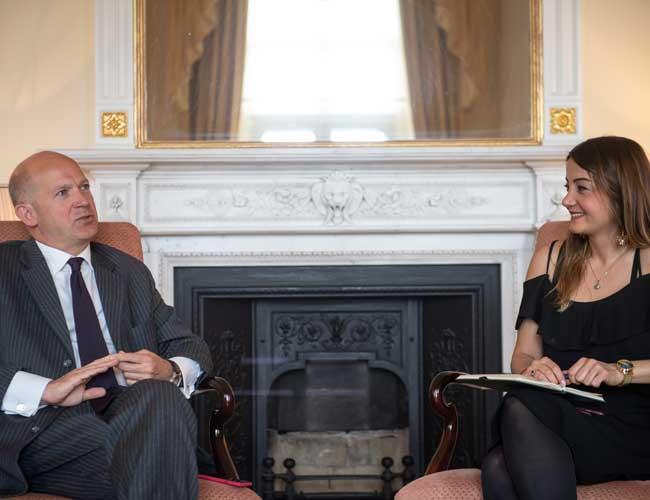
The United Kingdom has “a lot of respect and consideration” for the views of the Turkish government regarding the Syrian Kurdish People’s Protection Units (YPG), new British Ambassador to Ankara Sir Dominick Chilcott has told daily Hürriyet.
“We are not naïve. We understand there are very close links between the YPG and the [outlawed Kurdistan Workers’ Party] PKK,” Chilcott said speaking prior to Turkish President Recep Tayyip Erdoğan’s visit to London.
Chilcott said there is a “rich and important relationship” between Turkey and the U.K.
“Turkey has become an indispensable partner of the U.K. If you look at the areas where the U.K. is engaged internationally, broadly divide them into three: The protection of British nationals overseas, the national security of the U.K. at home, and the economic prosperity of the U.K. In each of these areas Turkey is a very important partner. Turkey’s importance to us, and maybe our importance to Turkey, suggests that there a strategic quality to our relationship,” he added.
“We have proscribed the PKK as a terrorist group for many years. We haven’t prescribed the YPG at the moment but we are not naive, we understand there are very close links between the YPG and the PKK. If British people go off to fight with the YPG there is a strong possibility that they are breaking the law in the U.K. And when they return to the U.K. they are arrested. The policies [of Ankara and London] are quiet aligned on the YPG issue at the moment,” Chilcott said.
He specifically referred to two British nationals who were arrested after fighting for the YPG and whose trials recently began in the U.K.
“I think that’s quite a clear message to people that this is not something the government supports,” Chilcott said.
Regarding the two countries’ policies on Syria, Chilcott said both Turkey and the U.K. started from the position thinking that Syrians would be better off under a different regime with the departure of the Bashar al-Assad regime, but recently Ankara’s main concern has become the security threat posed by Kurdish militants along its borders.
“Our priority has been trying to bring an end to the civil war and to deal with the threat posed from Syria by DAESH. Turkey has an additional or even more urgent concern about the threat posed by PKK terrorism as well as DAESH terrorism. The potential threat posed by the YPG and the actual threat posed by the PKK are more urgent and direct concerns to Turkey than they are to us, because obviously they are just across the border from Turkey,” Chilcott said.
Regarding the July 2016 military coup attempt in Turkey, Chilcott said “we don’t want the U.K. to be a safe place for any of the attempted coup plotters.”
“When the coup attempt happened we were appalled at the attack on Turkish democracy and on the elected Turkish government,” he said.
“We were quick to express our condemnation of the coup. Alan Duncan, who was minister for Europe at the time, visited Turkey three days after the coup attempt took place. That was a very important sign of solidarity with the Turkish government. For the attempted coup plotters, we don’t want the U.K. to be a safe place for them to seek refuge in. Our ability to take action against individuals will always depend on our having information or evidence that we can use in line with the law. That is why we rely on the information from the Turkish government to enable us to take actions against particular individuals,” Chilcott said.
He also noted that the involvement of the network of U.S.-based Islamic preacher Fethullah Gülen in the coup attempt was “certain.”
“We’ve got no sympathy for the people involved in the organization behind the coup. We don’t have any doubt that it was a Gülenist coup. In cooperation with the Turkish authorities we would be more than willing to take steps against people where we have the evidence to enable us to do it,” Chilcott added.